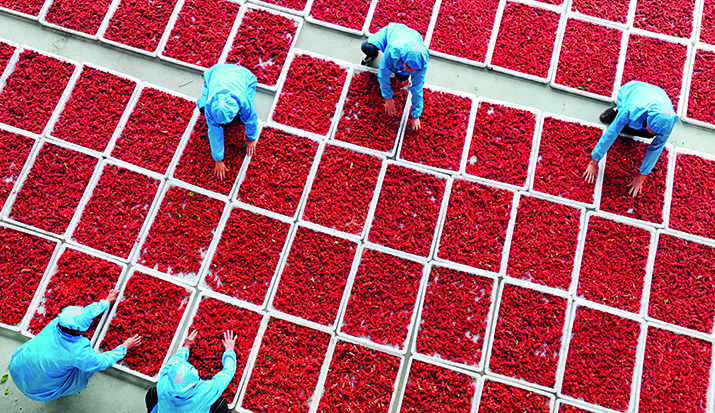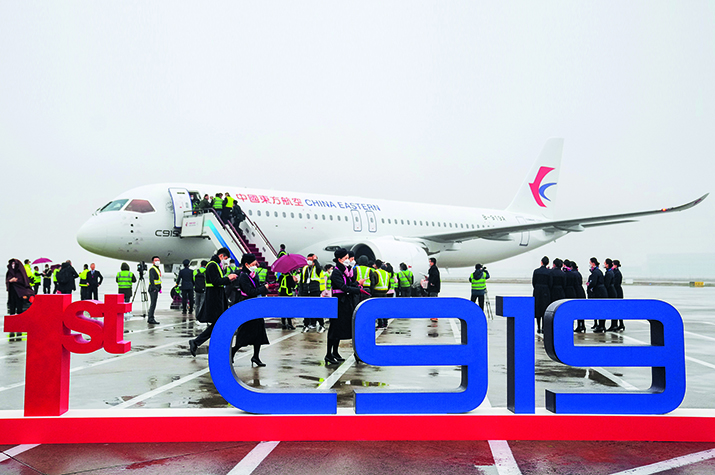|
||||||||||
| Home Nation World Business Opinion Lifestyle ChinAfrica Multimedia Columnists Documents Special Reports |
|
||||||||||
| Home Nation World Business Opinion Lifestyle ChinAfrica Multimedia Columnists Documents Special Reports |
| Current Cover Story |
| Ensuring Stable Growth |
| China’s Central Economic Work Conference maps out tasks and priorities for economic development in 2023 |
| By Xia Yuanyuan 丨VOL. 15 February 2023 ·2023-01-27 |

Staff of Yuzheng Traditional Chinese Medicine Cooperative in Luonan County, Shangluo City, Shaanxi Province, dry the newly picked schisandra chinensis on 19 December 2022
The year 2022 was extraordinary for China. In the face of multiple challenges, the country maintained the overall stability of its economy by striking a balance between anti-COVID-19 measures and economic and social development.
Now that the country has adjusted its anti-COVID-19 measures in light of the pandemic situation and lifted most of the COVID-related curbs, all eyes are set on the impending economic recovery in 2023. What kind of economic policies will be adopted in 2023? What measures will China take to revive its economy? The Central Economic Work Conference (CEWC), an annual meeting of China’s top leadership held in Beijing on 15-16 December, provided the answers: ensuring economic stability will be the top priority for the policymakers in 2023.
China will continue to implement proactive fiscal policy and prudent monetary policy, while making efforts to intensify macro-control and coordinate various policies to promote high-quality development, according to the meeting.
Economists and officials said that the meeting sent a strong message that reviving the COVID-19-hit economy and bringing GDP growth back to a reasonable range will be a major task for the government.
“Over the past three years, China’s economic development has suffered setbacks under the impact of the pandemic. This meeting fully reflects the confidence and determination of the central government to boost the economy,” Zhao Haoxing, professor at Zhejiang Gongshang University, told ChinAfrica.
US investment bank Morgan Stanley raised its forecast for China’s GDP growth in 2023 to 5.4 percent from its previous outlook of 5 percent, predicting that a rebound in economic activity will come earlier and be sharper than expected.
Achievements and challenges
Though there is a gap between the actual economic growth in 2022 and the target set for the year, major economic indicators still stayed within an appropriate range, according to Han Wenxiu, executive deputy director of the Office of the Central Financial and Economic Affairs Commission of the Communist Party of China (CPC).
China’s GDP grew 3 percent year on year to a record high of 121.02 trillion yuan (about $17.95 trillion) in 2022, data from the National Bureau of Statistics (NBS) showed on 16 January. In the fourth quarter of 2022, the country’s GDP expanded 2.9 percent year on year.
During the past three years, China’s economy is expected to have expanded at an average annual growth rate of 4.5 percent, higher than the average growth pace of the global economy.
Apart from the overall economic growth, China has also outstripped the majority of countries in terms of trade volume, goods production and energy output, and kept its inflation rate at a relatively low level.
Chinese people’s basic livelihood has been guaranteed during the pandemic. A total of 11.45 million new urban jobs were created nationwide in the first 11 months of 2022, and the consumer price index has remained generally stable over the years despite mounting global inflation pressure.
China’s grain output has stayed above 1.3 trillion jin (650 million tonnes) for seven consecutive years since 2015, and hit a new record high of 1.36 trillion jin in 2021, according to the National Food and Strategic Reserves Administration.
At the same time, the CEWC pointed out that the foundation of China’s economic recovery is not yet solid, the triple pressures of shrinking demand, supply shock and weakening expectations still exist, and the external environment is volatile, which has deepened the impact of the pandemic on China’s economy. However, it should be noted that China’s economy is resilient, has great potential and is full of vitality. Various policy interventions are having an effect, and economic activity is expected to pick up in 2023.

Diners flock to restaurants at Wukesong Arena in Beijing’s Haidian District on 25 December 2022
Consumption a priority
Boosting domestic consumption and fostering a stronger domestic market are among the top tasks in the economic work in 2023, according to the CEWC.
The country will focus on boosting domestic demand this year by prioritising the recovery and expansion of consumption, increasing urban and rural personal incomes through multiple channels and encouraging investment of more private capital in the construction of key national projects, said the conference.
“There is an urgent need for China to expand domestic demand, as external demand could deteriorate in 2023 due to a slowdown of the world economy,” Bai Ming, deputy director of the International Market Research Institute under the Chinese Academy of International Trade and Economic Cooperation, told ChinAfrica. “This is a correct decision made at the national level when considering the current situation.”
As China accelerates the building of a “dual circulation” development paradigm to ensure long-term, high-quality growth, consumption has become the leading driving force of the country’s economic growth. According to a guideline released by the CPC Central Committee and the State Council on 14 December 2022, the share of consumption in the GDP has remained above 50 percent in China for 11 consecutive years. Therefore, the recovery of consumption is of great significance for promoting domestic demand and stabilising growth.
Wu Sa, deputy director of the Economic Research Institute under the China Academy of Macroeconomics, believes that since the 18th CPC National Congress in 2012, China’s consumption-led domestic demand development pattern has basically taken shape. In recent years, though consumption has also been seriously impacted by the pandemic, it is still the most promising area for expanding domestic demand in 2023. Therefore, to achieve the 2023 economic growth target, it is necessary to further increase efforts to raise consumer spending, he said.
Zhao said that the market should provide more high-quality goods and services to attract consumers in the future. “The government should support cultivating ‘small yet smart’ new consumer entities. At the same time, it should develop a number of powerful platforms or leading enterprises to improve the quality and efficiency of supply and expand this effective domestic demand,” Zhao told ChinAfrica.
In order to restore and expand consumption, it is very important to increase residents’ income, Zhao noted. The CEWC clearly proposed that the country should increase urban and rural residents’ incomes through multiple channels.
The government needs to do everything possible to increase employment, encourage the development of small and medium-sized enterprises and self-employed and private businesses, encourage innovation and entrepreneurship, create a good business environment, and activate China’s 160 million market players; in addition, it should improve the income distribution system and the social security system, suggested Xu Hongcai, deputy director of the Economic Policy Commission at the China Association of Policy Science.

A C919 passenger aircraft, China’s first homegrown large jetliner, sporting the logo of China Eastern, stands at Shanghai Pudong International Airport in Shanghai on 9 December 2022
Support to private sector
The government’s plan also aims to inject more confidence into entrepreneurs, and encourage them to double down on innovation to seek breakthroughs in business and technology.
The conference stressed that it is important to work unswervingly both to consolidate and develop the public sector and to encourage, support and guide development of the private sector.
China’s private businesses have played a big part in driving the country’s economic development. The private sector contributes about 50 percent of the country’s tax revenue, 60 percent of the GDP, 70 percent of technological innovation and 80 percent of urban employment, according to figures from the Ministry of Industry and Information Technology.
Zhao said that the pandemic has created many difficulties for the private economy and the small and medium-sized enterprises in production and operation, making a dent on their confidence and growth expectations.
The meeting said legal and institutional arrangements must be made to ensure the equal treatment of private and state-owned enterprises. Law-based protection will be provided to the property rights of private enterprises and to the interests of entrepreneurs.
Chi Renyong, president of the China Institute of Small and Medium Enterprises at the Zhejiang University of Technology, suggested that the government should further reduce taxes and fees, help enterprises affected by the pandemic to solve problems, duly understand the situation of enterprises’ work and production, actively help enterprises to ease production and operation difficulties, and cooperate with relevant departments to continue to introduce phased and targeted tax and fee reduction measures to ease business difficulties.

An employee works at an automobile company in Yuyao, east China’s Zhejiang Province, on 5 January
Unwavering opening up
As the world’s second-largest consumer market, second-largest source of foreign investment and a major trading partner of over 130 countries and regions, China remains committed to promoting high-level opening up and continues to be a firm advocate of global cooperation and open economy.
The conference noted that the country will make greater efforts to attract and utilise foreign capital, widen market access, promote the opening up of modern service industries, and grant foreign-funded enterprises national treatment.
According to the NBS, in the first 11 months of 2022, foreign direct investment into the Chinese mainland grew 12.2 percent to top $178 billion, despite growing fears about a global recession. In November 2022, a total of $73.52 billion worth of tentative deals were reached for one-year purchases of goods and services at the Fifth China International Import Expo in Shanghai.
The growth “proves that China has opened up its market wider to the world and has actively participated in international trade even during the COVID-19 pandemic,” Joseph Matthews, a senior professor at the BELTEI International University in Phnom Penh, Cambodia, told Xinhua News Agency.
“China is the largest manufacturing country. The stability of China’s manufacturing industry plays an important role in the stability of the global industrial chain and supply chain. The revival of China’s economy in 2023 will further drive the world economic recovery,” Bai told ChinAfrica.
Besides, more efforts to attract and utilise foreign capital will help to promote China’s high-quality economic development, better meet the needs of China’s consumption upgrading, and promote the safe and stable operation of the industrial chain and supply chain, which is of great significance for China’s modernisation.
“China’s economic recovery will also provide opportunities for Africa. China’s huge market demand will continue to help African countries to realise their trade potential,” Zhao told ChinAfrica.
Data show that China has maintained its position as Africa’s largest trading partner for 13 consecutive years. China is also the second-largest export destination of African agricultural products. In recent years, the average annual growth rate of African agricultural exports to China has reached 11.4 percent.
China’s Major Economic Tasks for 2023
Boosting domestic demand by prioritising the recovery and expansion of consumption;
Accelerating the building of a modern industrial system;
Deepening the reform of state-owned enterprises while improving their core competitiveness;
Attracting and utilising foreign capital, widening market access, promoting the opening up of modern service industries, and granting foreign-funded enterprises national treatment;
Forestalling and defusing major economic and financial risks, promoting the steady development of the property market.
| About Us | Contact Us | Advertise with Us | Subscribe |
| Copyright Beijing Review All rights reserved 京ICP备08005356号-5 京公网安备110102005860号 |